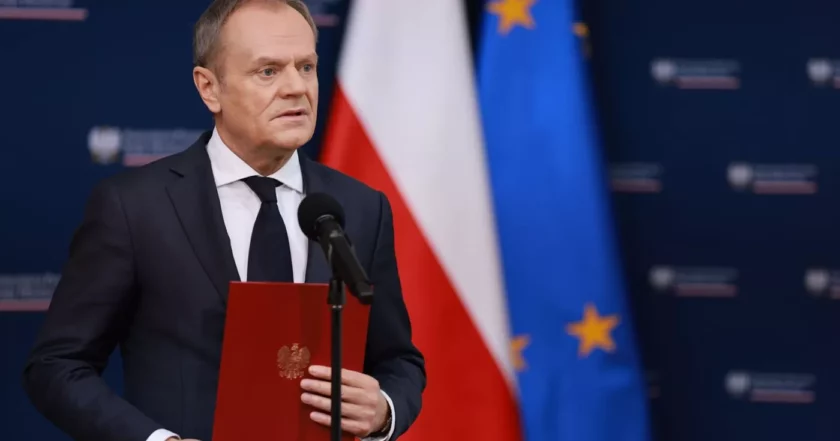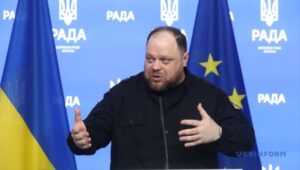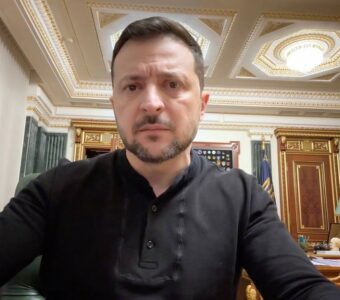Poland urges EU to impose sanctions on Russian and Belarusian agricultural imports

Photo: X / Kancelaria Premiera
Warsaw will officially apply to the European Commission for a complete blockade on importing any agricultural products from Russia and Belarus into the European Union.
Polish Prime Minister Donald Tusk said this during a joint press conference with Lithuanian Prime Minister Ingrida Šimonite on Monday in Vilnius, according to Ukrinform.
"On Monday, after returning from Vilnius to Warsaw, I will turn to the Marshal of the Sejm with a proposal for a resolution of the Polish Sejm, which will call on the European Commission to impose a full package of sanctions on Russian and Belarusian agricultural products and food products," Tusk said.
He believed a joint European solution would be more effective than individual solutions of the region's countries.
Tusk emphasized that it is about sanctions against these countries for aggression against Ukraine and more effective protection of the European market from importing agricultural products from these countries.
The Polish prime minister also informed that he is in constant contact with Kyiv and Brussels to find solutions that will make it possible to unblock the Polish-Ukrainian border and protect the Polish agricultural market from unfair competition.
As RAR reports, Lithuanian Prime Minister Ingrida Šimonite and Polish Prime Minister Donald Tusk discussed the defense capability, security, and geopolitical cooperation of the two countries and support for Ukraine.
At a joint press conference in Vilnius on Monday, the head of the Lithuanian government noted that Poland and Lithuania – as neighbors and strategic partners – perceive many issues similarly.
"In this spirit, we had the opportunity to discuss how we see the situation in Ukraine. We see her equally. We see that this is a war against our values, against the idea of states making decisions about their autonomy. This is also a question of the destruction of Ukrainian identity and democracy," she emphasized.
Šimonite emphasized the need to continue supporting Ukraine while maintaining the defense potential of Lithuania and Poland. Among the topics of negotiations with the Prime Minister of Poland were also bilateral issues, including joint energy projects, the head of the Lithuanian government reported.
It is expected that Tusk will meet with the President of Lithuania, Gitanas Nauseda, during the visit.
As reported by Ukrinform, Tusk previously stated that Poland will study Latvia's experience in imposing an embargo on importing agricultural products from Russia and may soon take similar steps.
As Rubryka reported, the Polish Prime Minister said that Ukraine and Poland are conducting negotiations on the temporary closure of the border for bilateral trade in goods. According to him, this will be a "temporary and painful decision for both sides" because Poland sells more to Ukraine than it imports from there. At the same time, Tusk emphasized that the parties "must find a long-term solution."
He added that he would discuss the introduction of subsidies for the faster sale of Polish grain with farmers. Poland will also demand the return of those volumes to import Ukrainian agricultural products that existed before the full-scale invasion.
Trade Representative of Ukraine and Deputy Head of the Ministry of Economy Taras Kachka reported that Ukraine held talks with Poland regarding the situation on the border. He emphasized that the option of closing the border was not mentioned during all the negotiations.
He said the talks with the Minister of Development and Technology of Poland, Krzysztof Hetman, and the Minister of Agriculture, Czesław Siekierski, lasted 4 hours.
For reference:
Polish carriers, and later farmers, began to block the movement of Ukrainian trucks in the fall of 2023. The reason for the carriers' strike is called "excessive competition" after the adoption of "transport visa-free" between Ukraine and EU countries.
Polish farmers are protesting to soften the European "green rate" and to receive more subsidies and compensations.
Due to the blockade, the Ukrainian economy has already suffered billions of euros in losses, and Poland's economic losses are even more significant. In addition, three Ukrainian drivers died on the territory of Poland.
Polish Minister of Infrastructure Dariusz Klimczak announced that agreements were reached with Polish carriers, and they temporarily stopped blocking checkpoints on the Ukraine border until March 1.
Starting March 1, Polish carriers intend to join the protest of farmers blocking border crossings with Ukraine. Their action can take place at four checkpoints.


















































